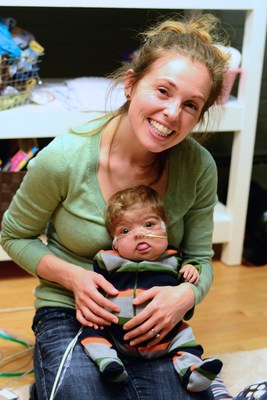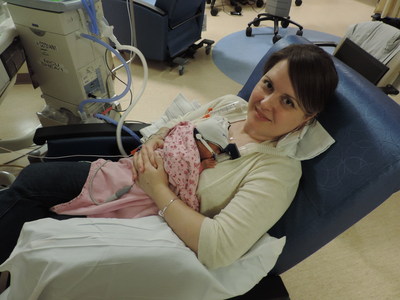October is Infant Loss Awareness Month
ANN ARBOR, Mich., Oct. 1, 2014 /PRNewswire/ — With October being Infant Loss Awareness month, parents, clinicians, and researchers are launching the NEC Society, a non-profit dedicated to protecting babies from necrotizing enterocolitis (NEC). NEC is a leading cause of infant death, claiming the lives of about 500 babies every year in the U.S.

Two mothers who recently lost their babies to NEC spearhead the NEC Society. NEC is a life-threatening neonatal condition that causes the inflammation and death of intestinal tissue. Once diagnosed, many babies only live for a few hours or days, and survivors can have lifelong neurological and nutritional complications. Infant death due to NEC is more common than infant death due to influenza, allergies, car accidents, choking, and drop-side crib accidents combined. Yet, NEC rarely receives media attention and has never benefited from a compelling prevention campaign. Typically, families learn about NEC for the first time when their baby is already critically ill with the disease.
Jennifer Canvasser, founder of the NEC Society, explains, "My son Micah was critically ill when I first heard about NEC. In a matter of hours, Micah went from being a beautiful five-pound baby, to being critically ill and intubated, with cords, wires and tubes on each of his extremities. It happened so fast. During Micah's downward spiral, I searched for resources related to NEC, but there was no organization committed to protecting infants from this disease."
In addition to the approximately 500 infant deaths annually in the U.S., thousands more infants are impacted by NEC that results in extensive surgeries, lengthy hospitalizations and lifelong complications. Despite medical advancements, the NEC mortality rate has not improved in over thirty years. The NEC Society believes the status quo is unacceptable. Research has shown that there are ways to help prevent this devastating disease, but lack of prioritization, funding and awareness have hindered meaningful progress.
The NEC Society seeks to close the gap between best practices and what is actually happening in neonatal intensive care units (NICUs) across the country. The NEC Society wants to see hospitals, policymakers, and the public prioritize this common, costly, and deadly neonatal disease.
Erin Umberger, a member of the NEC Society's Board of Directors, describes her experience, "NEC stole my daughter's life. The loss of a child is tragic and devastating. It is a lifelong loss. A piece of yourself dies along with your child. When I lost Sarah, I had to relearn how to breathe, eat, sleep and live without her in my arms. We must come together to stop this terrible disease."
Members of the NEC Society's Scientific Advisory Council are among the most experienced NEC clinicians and researchers in the world. Dr. Alexander Penn, a member of the NEC Society's Scientific Advisory Board states, "The mechanisms underlying NEC are still incompletely understood. NEC is related to the immaturity of the intestinal tract and formula feeding significantly increases the risk of developing NEC in premature infants. Our own laboratory has shown that digested formula, but not digested fresh breast milk, is highly toxic to intestinal cells lacking the protection of a mucin barrier present in mature intestines. This only reinforces the existing literature stressing the importance of an exclusive human milk diet for premature infants."
The NEC Society is bringing together internationally recognized NEC researchers and clinicians, mobilizing NEC activists around the world, and striving to empower families of fragile infants who are at risk of being impacted by NEC. Already, the NEC Society has launched a groundbreaking international survey of families impacted by NEC to identify gaps in knowledge and communication about the disease. The NEC Society is also embarking on a campaign that will urge NICUs to ensure that all fragile infants have access to breast milk, as breast milk protects fragile infants from NEC.
While we cannot eliminate the risk of NEC, we absolutely can – and must – reduce the risks by implementing a range of preventative and protective measures. Hundreds of U.S. families lose their babies to NEC every year. The NEC Society will not stop fighting until fragile infants are best protected from necrotizing enterocolitis.
Contact: Jennifer Canvasser, jmcanvasser@gmail.com, 408-264-4984
